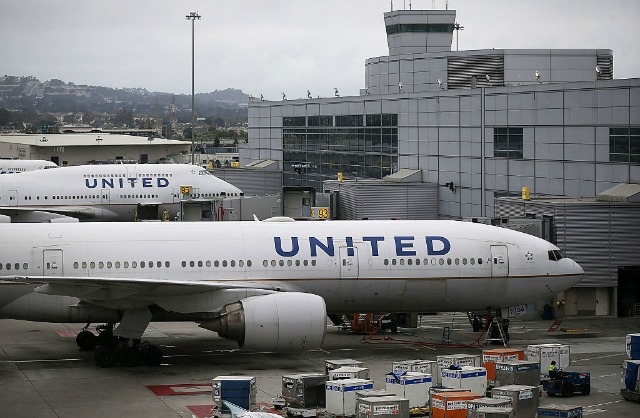Confusing & Discouraging Answers Come From Hearing On United Airlines, Chicago Aviation Dept.
By Stephen Gossett in News on Apr 14, 2017 2:27PM

John Slater, a United Airlines vice president, testifies at a City Council committee hearing in Chicago on Thursday, April 13. Slater said that bumping passengers to accommodate airline employees happens infrequently, and that federal guidelines requiring rest for crew members made it necessary to get the employees on the United flight in which Dr. David Dao was dragged from on Sunday. (AP Photo/Teresa Crawford)
Plenty of key questions were met with either cloudy answers or deeply discouraging ones as Chicago aviation officials and United Airlines brass on Thursday both faced often-stern interrogation by a Chicago City Council committee in the wake of the violent removal of a passenger from a flight at O’Hare International Airport on Sunday.
United Airlines' role
When pressed by an almost performatively feisty Ald. Ed Burke (14th Ward), John Slater, vice president of operations for United Airlines at O'Hare International Airport, acknowledged “there’s no script” for how it involuntarily deplanes a passenger. Slater said the situation comes up infrequently—but Burke and other aldermen pushed back on that sentiment at times in the chamber.
There's "no playbook," Slater said.
Another lingering question remains why Dr. David Dao—who suffered a broken nose and concussion and lost two teeth in the incident, according to his lawyer—wasn’t offered the full $1350 that airlines are permitted to offer for removals. (United previously said they offered Dao $1000; his lawyer said passengers were offered $800.) But at the hearing, United would not say how often the airline proposes the max amount.
Early in the inquiry, Slater made it clear that United personnel were “limited in what we can say” due to investigations and likely litigation.
Slater said most situations in which passengers are asked to give up a space are handled at the gate, before boarding. "I've never seen a situation like this," he said.
Dao was one of four people asked to give up their seat on the fully booked Kentucky-bound plane and take a later flight, in order to make room for four United crew members. (United targets passengers to bump based on their ticket price paid, whether they are frequent fliers and time of check in, Slater said.) Three people accepted, but Dao, who said he had patients to see the next day, refused to be bumped. An airline staff member—although United reps at the hearing would not say which one —called authorities, leading to the bloody tangle with Chicago aviation officers. (The three aviation security officers have been placed on leave; and, you might have noticed, United CEO Oscar Munoz is running triage after multiple PR face plants.)
Chicago law enforcement “should not be doing the dirty work for the Friendly Skies airline,” Burke said on Thursday.

Getty Images
Chicago Department of Aviation's role
As for those aviation officers—who, like all Chicago aviation security, are not part of the Chicago Police Department and don’t carry guns—the picture remained foggy about their roles and restrictions, too. Ginger Evans, commissioner of the Chicago Department of Aviation, told committee members that the aviation officers had authority at least to board. At the same time, Jeff Redding, Deputy Commissioner of Security for CDA, said that aviation security officers are not supposed to board planes in order to handle customer service incidents, per department policy. As to whether or not Dao's case constituted a customer service or a security incident, Redding said he could not say due to the investigation.
“If there's no imminent threat or no charges being drawn, then you don't need to board the plane, there's no purpose for it, “ Redding said, about onboard customer service problems.
During one stretch of Burke’s conspicuous grilling, the alderman also asked about use-of-force procedures as related to aviation security officers and how often such training is reinforced. But Redding said guidelines were presently being updated—which allowed him to go without giving a more direct answer.
Furthermore, Evans’ response as to why aviation officers sported “police” on their jackets during the incident was also wanting. A directive had been issued in January to change labels to read "security" instead of "police," according to the CDA commissioner. But Evans said she would “prefer to answer at a later time" as to why no such change was visible on the footage of Dao’s removal.
Nevertheless, there were some concrete moments to be found: Evans, who expressed “extreme regret,” said the department would pursue increased training in de-escalation tactics and emotional intelligence. She also said that an outside security expert would review Chicago's airport policies. And United said it will finish a review of its own pertinent policies by April 30.
But overall, many question marks live on. Meanwhile, as court documents have been filed to protect relevant airline and city materials, a lawsuit is all but guaranteed—one that could target both United and the City of Chicago.